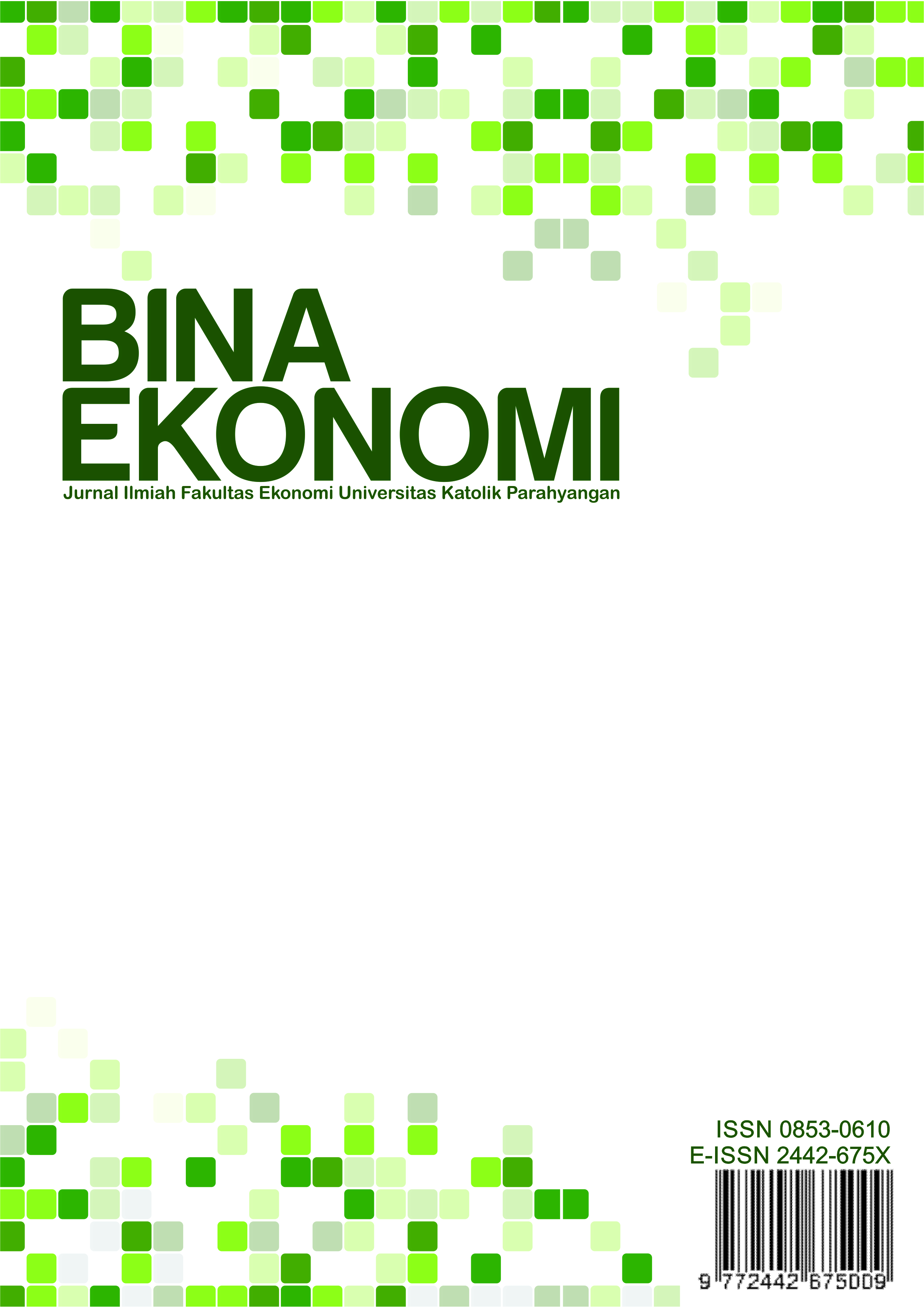PENGARUH PENGAWASAN, TARIF CUKAI, DAN BATASAN MINIMUM HARGA JUAL ECERAN TERHADAP TANGKAPAN ROKOK ILEGAL
DOI:
https://doi.org/10.26593/be.v27i2.6002.124-140Keywords:
Excise tariff, Retail selling price, Ilegal Cigarettes, Supervision.Abstract
Illegal cigarettes are very dangerous, both for health and for state revenue, so DJBC, as the agency authorized to oversee the circulation of cigarettes, must catch illegal cigarettes to suppress the circulation of illegal cigarettes in the future. The purpose of this study was to determine the effect of supervision, excise tariffs, and minimum HJE limits on illegal cigarette catches in Indonesia. The authors carried out a descriptive analysis of the realization of supervision budget data, number of DJBC employees, excise rates, minimum retail selling price limits, and catches of illegal cigarettes. The authors obtained these data from the Directorate General of Customs and Excise and from the Central Bureau of Statistics. The result is that the increase in excise rates and the minimum HJE limit in Indonesia so far have not had a significant impact on illegal cigarette catches. The only thing the government can do to suppress the circulation of illegal cigarettes is to strengthen supervision by increasing the supervision budget and human resources, both in terms of quantity and quality. Tightening the overall supervision will be able to optimize the catch of illegal cigarettes and reduce the circulation of illegal cigarettes in the future.
References
Ahsan, A., Wiyono, N. H., Setyonaluri, D., Denniston, R., & So, A. D. (2014). Illicit Cigarette Consumption and Government Revenue Loss in Indonesia. Globalization and Health, 10, 1–8.
Allen, E. (2012). The Illicit Trade in Tobacco Products and How to Tackle it. World Customs Journal, 6(2), 121–130.
Allingham, M. G., & Sandmo, A. (1972). Income Tax Evasion: A Theoretical Analysis. Journal of Public Economics, 323–338.
Anugerahani, I. D., & Wahjono, S. I. (2013). Pengaruh Implementasi Anggaran Berbasis Kinerja Terhadap Kinerja Pegawai ( Studi Pada Badan Pengelola Keuangan dan Aset Daerah ( BPKAD ). Jurnal Ilmu Manajemen, Revitalisasi, 2, 147–162.
Burke, T. (2013). The Effect of Excise Taxes on Cigarette Smuggling : An Instrumental Variable Approach. http://scholarship.claremont.edu/cmc_theses/764
Azizah, E. N., & Purwana, A. S. (2021). Pengaruh Kebijakan Tarif Cukai Hasil tembakau dan Aktivitas Pengawasan Terhadap Peredaran Hasil Tembakau Ilegal. Jurnal Perspektif Bea Dan Cukai, 5(1), 63–78. https://doi.org/10.31092/jpbc.v5i1.1151
Chisha, Z., Janneh, M. L., & Ross, H. (2019). Consumption of legal and illegal cigarettes in the Gambia. Tobacco Control, 29, 254–259. https://doi.org/10.1136/tobaccocontrol-2019-055055
Curti, D., Shang, C., Chaloupka, F. J., & Fong, G. T. (2019). Tobacco taxation, illegal cigarette supply and geography: Findings from the ITC Uruguay Surveys. Tobacco Control, 28, 53–60. https://doi.org/10.1136/tobaccocontrol-2017-054218
Curti, D., Shang, C., Ridgeway, W., Chaloupka, F. J., & Fong, G. T. (2015). The Use of Legal, Illegal and Roll-Your-Own Cigarettes to Increasing Tobacco Excise Taxes and Comprehensive Tobacco Control Policies: Findings From the ITC Uruguay Survey. Tobacco Control, 24, 17–24. https://doi.org/10.1136/tobaccocontrol-2014-051890
Feige, E. (2009). Defining And Estimating Underground And Informal Economies: The New Institional Economics Approach. World Development, 989–1002.
Gallego, J. M., Llorente, B., Maldonado, N., Otálvaro-Ramírez, S., & Rodríguez-Lesmes, P. (2020). Tobacco Taxes and Illicit Cigarette Trade in Colombia. Economics and Human Biology, 39, 1–11. https://doi.org/10.1016/j.ehb.2020.100902
Golden, S., Farrelly, M., Luke, D., & Ribisl, K. (2016). Comparing Projected Impacts of Cigarette Floor Price and Excise Tax Policies on Socioeconomic Disparities in Smoking. Tobacco Control, 60–66.
Kasri, R. A., Ahsan, A., Wiyono, N. H., Jacinda, A. R., & Kusuma, D. (2021). New Evidence of Illicit Cigarette Consumption and Government Revenue Loss in Indonesia. Tobacco Induced Diseases, 19(November), 1–8. https://doi.org/10.18332/TID/142778
Mankiw, N. G. (2011). Pengantar Ekonomi Mikro. Salemba Empat.
Mardiasmo. (2009). Perpajakan. Salemba Empat.
Nguyen, A., & Nguyen, H. T. (2020). Tobacco Excise Tax Increase and Illicit Cigarette Consumption: Evidence From Vietnam. Tobacco Control, 275–280. https://doi.org/10.1136/tobaccocontrol-2019-055301
Purnomo, A., & Ariyansyah, Y. (2020). Analisis Implementasi Pengawasan Cukai Hasil Tembakau di Provinsi Lampung (Studi Pada Kantor Wilayah Direktorat Jenderal Bea Cukai Sumatera Bagian Barat). Agus Purnomo, Yossef Ariyansyah. Jurnal Kebijakan Dan Pelayanan Publik, 6(2), 1–11.
Rosen, H., & Gayer, T. (2010). PubliC Finance (Ninth). McGraw-Hill/Irwin.
Ross, H., Vellios, N., Batmunkh, T., Enkhtsogt, M., & Rossouw, L. (2020). Impact of tax increases on illicit cigarette trade in Mongolia. Tobacco Control, 2, 249–253. https://doi.org/10.1136/tobaccocontrol-2018-054904
Rudita, Y. (2018). Pengawasan Peredaran Rokok Ilegal dI Kabupaten Indragiri Hilir Oleh Kantor Pengawasan dan Pelayanan Bea dan Cukai Tipe Madya Pabean C Tembilahan. Universitas Islam Negeri Sultan Syarif Kasim Riau.
Santoso, D. B., & Erlando, A. (2020). Tobacco excise tax policy in indonesia: Who does reap the benefits? Entrepreneurship and Sustainability Issues, 8(1), 1108–1121. https://doi.org/10.9770/jesi.2020.8.1(74)
Vellios, N., van Walbeek, C., & Ross, H. (2020). Illicit cigarette trade in South Africa: 2002-2017. Tobacco Control, 29, s234–s242. https://doi.org/10.1136/tobaccocontrol-2018-054798


